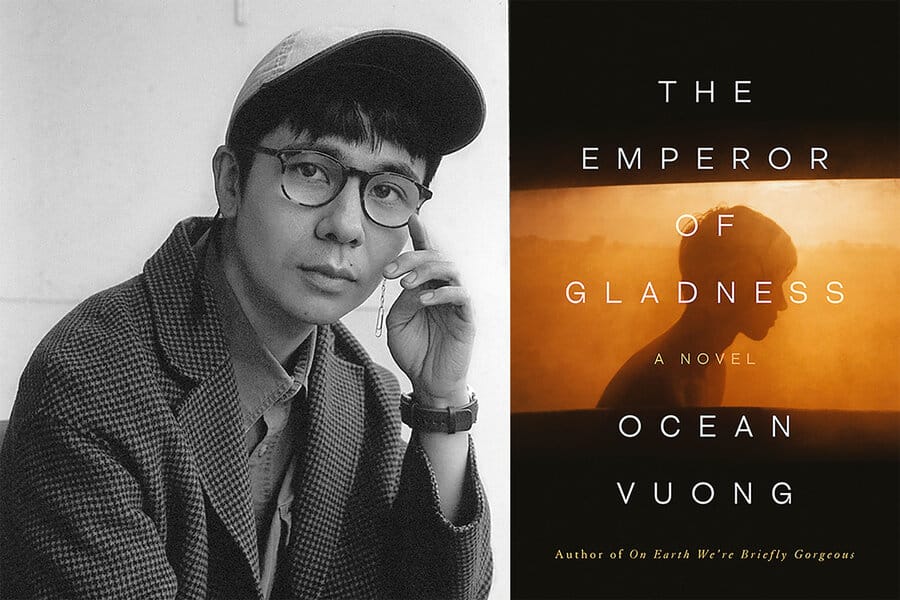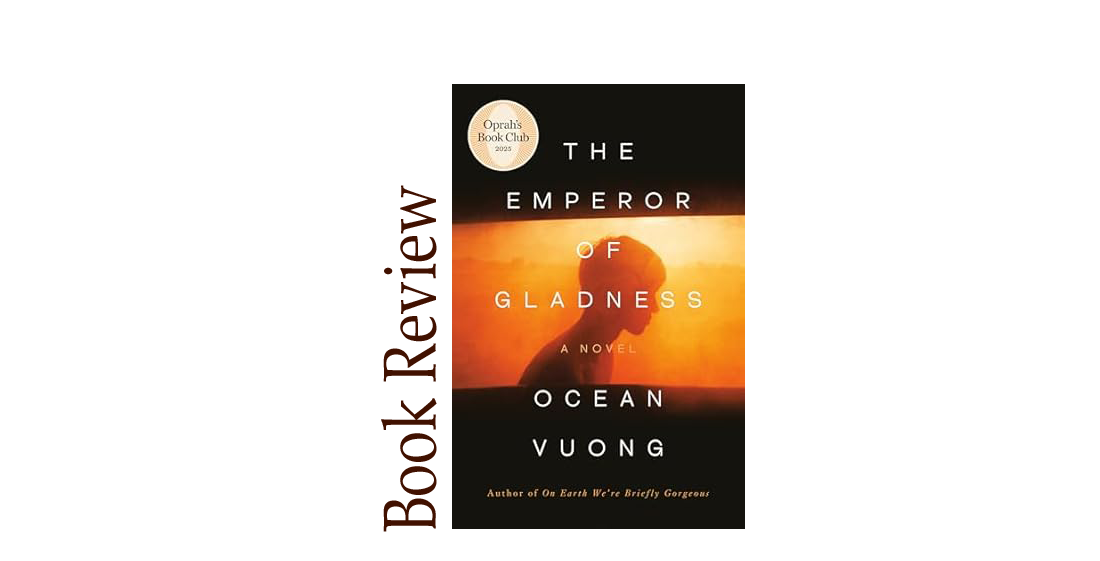- Date Published:
2025 - Length:
416 pages—Listening Time: 14 hr 10 minutes - Genre:
Literary Fiction, Contemporary Fiction - Setting:
2009, East Gladness, Connecticut - Awards:
The Guardian Book of the Day 2025-05-13
This book was released in May 2025. I'm pretty sure we will see it win many awards. - Languages:
English - Sensitive Aspects:
Despair, addiction, suicide, treatment of marginalized groups, war trauma, objectification, emotional sensitivity, LGBT - Movie:
As of July 2025, there are no current deals for movie adaptations. - Recommend for Book Club:
Yes, but make sure your group is ready for raw emotional responses

I frequently advise readers to keep a box of tissues on hand when reading certain works. For The Emperor of Gladness by Ocean Vuong, I would suggest that you go to Costco and buy a case of Kleenex. Prepare yourself for an intense emotional journey while reading this book.
This is the first time I've read Vuong's work. At the beginning of the book, there was no doubt that he is a poet. His descriptions are beautifully, almost symphonically written, creating a sensation of floating on a soft, billowy cloud. But, no matter how well-crafted the verbiage, I was looking for more...characters, a story, and a plot.
Patience is overrated. Bam! As soon as the action of the story commenced, Vuong seized my attention with a forceful shake. He didn't let go until the end of the book, emotionally ragdolling me many times. I'm awed at this 36-year-old poet's talent.
I absolutely fell in love with his characters too. Who wouldn't love a spunky 82-year-old Lithuanian woman with dementia who, according to Vuong, was a real person that he had cared for? Then there was the autistic cousin who is obsessed with the Civil War, a fast food manager who moonlights as a singing wrestler, and a brilliant yet melancholy Vietnamese opioid-addicted teen who is the only person who can soothe and bring them all together.
If this has piqued your interest, get the book, grab your tissues, and read on.

The Emperor of Gladness by Ocean Vuong is a novel centered on Hai, a 19-year-old Vietnamese American living in the post-industrial town of East Gladness, Connecticut. At the story’s outset, Hai is at a breaking point: estranged from his mother, struggling with addiction, and weighed down by failed dreams and the trauma of his past. One rainy evening, he stands on a bridge, contemplating suicide, when he is interrupted by Grazina, an elderly widow with dementia, who calls out to him from across the river and persuades him to reconsider his decision.
With nowhere else to turn, Hai becomes Grazina’s caretaker. Over the course of nine months, the two form a deep, transformative bond rooted in empathy, shared vulnerability, and mutual need. Their relationship is marked by moments of spiritual reckoning and heartbreak, ultimately helping Hai to re-examine his own life, his strained family ties, and his place within a struggling community.
Hai’s journey is set against the backdrop of recession-era America, with the novel exploring themes such as found family and unexpected friendship, the lingering effects of war and generational trauma, the challenges of addiction, poverty, and marginalization, the dignity of labor, the realities of working-class life, and the search for meaning and moments of joy amid suffering
Through his work at a local fast food restaurant and his interactions with coworkers—each grappling with their own hardships—Hai finds a sense of belonging and purpose. The narrative weaves together personal memories, the cycles of history, and the everyday struggles of those living on the fringes of society, painting a vivid portrait of American life marked by both violence and tenderness.
The novel’s title is metaphorical: the “emperor of gladness” is not a literal figure but represents the capacity to find fleeting joy and meaning even in the midst of chaos and pain. In the end, Hai reflects on the lives that have touched his own and recognizes that survival itself is an act of quiet triumph, a benediction for all who endure.
Ocean Vuong’s style—blending poetic language with raw emotional honesty—animates this story of loss, hope, and the pursuit of a second chance. The novel ultimately affirms the power of human connection and resilience, suggesting that everyone, in their own way, can be an emperor of gladness.

You should consider reading The Emperor of Gladness if you are drawn to novels that explore the complexities of chosen family, unexpected friendship, and survival on the fringes of society. This book has been widely praised for its compassionate portrayal of marginalized lives, its emotional depth, and its ability to find dignity in ordinary, often overlooked experiences.
Key reasons to read this novel:
Profound Human Connection
The story centers on Hai, a 19-year-old Vietnamese American, and Grazina, an 82-year-old Lithuanian widow with dementia. Their unlikely bond, formed in a struggling Connecticut town, becomes a moving meditation on empathy, care, and the ways people support each other through hardship.
Exploration of Survival and Endurance
Rather than focusing on grand transformations, Vuong’s novel finds meaning in the act of enduring—showing up, caring, and persisting even when life feels overwhelming. It offers a refreshing take on sadness and vulnerability, suggesting these states don’t need to be “fixed” to be meaningful.
Rich, Poetic Prose
Vuong’s writing is celebrated for its lyricism, formal innovation, and ability to capture both grit and tenderness. His prose invites readers to slow down and reflect, often blurring the line between poetry and narrative.
Relevant Social Themes
The novel explores the realities of labor, immigration, generational trauma, and the search for belonging in contemporary America. It’s particularly attuned to the struggles of those who feel invisible or left behind by society.
Critical Acclaim
The book is an instant bestseller, an Oprah’s Book Club pick, and has been described as “stunning,” “magnificent,” and “a masterwork of compassion and complexity” by critics and readers alike.
Emotional Resonance
Many readers report being deeply moved by the novel’s balance of heartbreak and hope, its unsentimental approach to pain, and its celebration of small, everyday acts of kindness.
If you appreciate literary fiction that is both challenging and accessible, that values the quiet heroism of ordinary people, and that leaves you with a deeper understanding of what it means to survive and care for others, The Emperor of Gladness is a standout choice.


Get Ocean Vuong Boks
Bookshop.org was created as a socially conscious alternative to Amazon, with the goal of helping local, independent bookstores thrive. This is why Readers With Wrinkles supports their efforts. Please join us in this effort by purchasing your next read here.

If you loved The Emperor of Gladness by Ocean Vuong—a novel celebrated for its lyrical prose, focus on chosen family, and the quiet dignity of those living on society’s margins—there are several books with similar themes and emotional resonance you may enjoy. The following books center on characters who are outsiders or survivors, often forming makeshift families and finding hope in unexpected relationships. They are marked by beautiful writing, emotional depth, and a focus on the quiet, transformative moments of everyday life.
- On Earth We’re Briefly Gorgeous by Ocean Vuong
Vuong’s debut novel is a poetic, semi-autobiographical letter from a son to his mother, exploring trauma, identity, and the immigrant experience with raw intimacy and lyricism. - The Solitude of Prime Numbers by Paolo Giordano
This novel follows two isolated individuals, each marked by early trauma, whose lives intersect in unexpected ways. It’s a meditation on loneliness, connection, and the ways we carry our wounds. - Beautyland by Marie-Helene Bertino
A quirky, moving story about a woman who believes she is an alien, searching for belonging and meaning in a world that feels alien to her. The story explores the concept of found family and the struggle for personal connection. - Blue Sisters by Coco Mellors
A story about three sisters grappling with loss and the complexities of family, set against a backdrop of grief, addiction, and the search for redemption. - All the Light We Cannot See by Anthony Doerr
This Pulitzer Prize-winning novel weaves together the lives of a blind French girl and a German boy during WWII, highlighting resilience, human connection, and the beauty found in unlikely places. - Where the Crawdads Sing by Delia Owens
Set in the marshes of North Carolina, this novel follows an isolated young woman as she finds connection and survival amid abandonment and prejudice. Themes of loneliness, nature, and unexpected bonds echo those in Vuong’s work. - The Passengers on the Hankyu Line by Hiro Arikawa
A gentle, interconnected story about strangers on a Japanese train, each carrying their own burdens. The novel explores fleeting connections and the small acts of kindness that can change lives. - Atmosphere by Taylor Jenkins Reid
While set in the world of NASA, this novel delves deeply into what it means to exist, feel, and connect, focusing on the human need for companionship and understanding. - The Correspondent by Virginia Evans
A story told through letters, centering on a cantankerous but endearing heroine whose life is shaped by her relationships and the power of communication. It’s both funny and sad, reminiscent of Elizabeth Strout’s work.


Comments